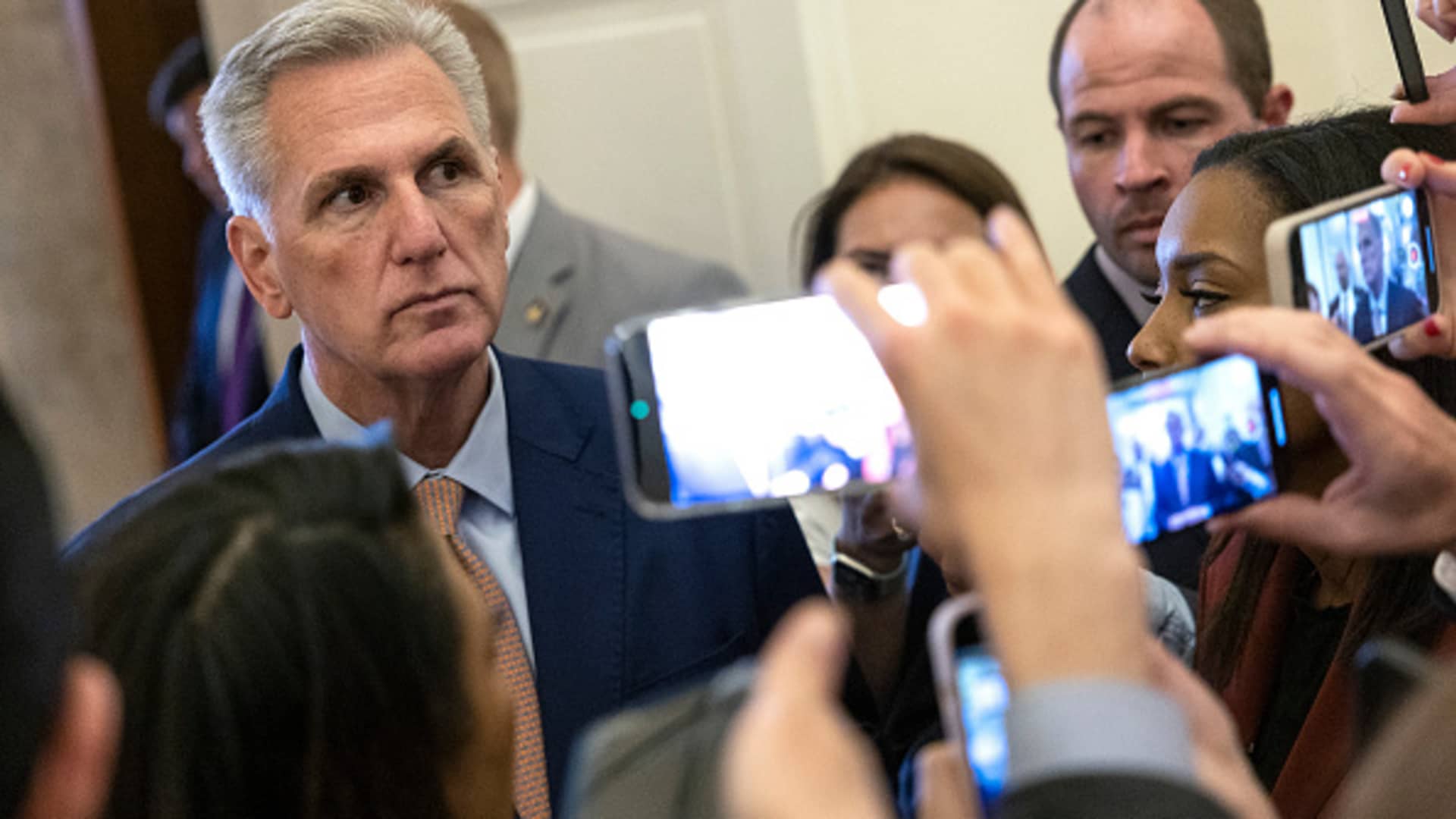U.S. House Speaker Kevin McCarthy (R-CA) speaks with reporters as he arrives for the day in the midst of ongoing negotiations seeking a deal to raise the United States’ debt ceiling and avoid a catastrophic default, at the U.S. Capitol in Washington, May 24, 2023.
Jonathan Ernst | Reuters
WASHINGTON — House Speaker Kevin McCarthy said negotiations with the White House over raising the U.S. debt limit Wednesday were still hung up over disagreement on the question of baseline spending, indicating that the two sides were still far with only eight days before the government could face an unprecedented default.
Stocks fell to session lows following McCarthy’s comments, as investors closely watched the talks for any sign of progress.
In the Capitol, negotiators for House Republicans and the White House were expected to resume talks in the conference room just off of McCarthy’s office, where they have holed up for hours every day this week.
The talks hit a “speed bump,” a Democratic official familiar with the situation told NBC News on Wednesday.
But outside the Beltway, concerns grew about whether negotiators would be able to reach a deal to cut government spending enough to win the GOP votes needed to pass a bill that raises the debt ceiling before June 1.
Treasury Secretary Janet Yellen said Wednesday she was already seeing “some stress in financial markets,” driven by fears that the U.S. could stumble into a first-ever debt default.
Debt ceiling related stress was impacting Treasury markets in particular, Yellen said at a Wall Street Journal event. These signs of stress “should be a reminder of the importance of reaching a timely agreement.”
But after a week of daily sessions led by a group of veteran negotiators, people on both sides say the gap between what House Republicans want and what the White House is willing to give seems wider than ever.
For example, one of the lead delegates for Republicans, Rep. Patrick McHenry of North Carolina, laid bare on Tuesday night what had up to that point only been implied, when a reporter asked him what concession Democrats were getting as part of the talks, in order to win their votes in the House.
“The debt ceiling,” he said.
“That’s what they’re getting,” added Rep. Garret Graves of Louisiana, another GOP negotiator.
This view of the past week as one where Democrats are forced to accept Republican demands, while Republicans in return offer only the chance to avoid a catastrophic debt default, would anger Democrats and decrease the odds of a deal. The GOP has pushed to cut spending as part of any deal to increase the debt ceiling, which on its own does not authorize new outlays.
A default would wreak havoc on the U.S. economy and force millions to at least temporarily lose government benefit payments many rely upon to survive.
With talks at an apparent breaking point for the second time in a week, and the likelihood of a deal in the next 24 hours — in time for the House to turn an agreement into a bill and vote for it before the weekend — looking very slim, McCarthy appeared open to letting members of the House leave D.C. for the Memorial Day weekend without a deal.
“I haven’t made that decision yet,” he told reporters Tuesday, but added, “I would have, depending on where we are in that moment, have them come home and come back.”
With Republicans appearing only to harden their position as time went on, Democrats on Wednesday accused McCarthy of caving to pressure from the far right of his caucus. They said he has yielded to members who have made a laundry list of demands, yet are unlikely to vote for a debt ceiling hike, no matter what it contains.
One of those laundry lists was released Wednesday by Rep. Chip Roy, R-Texas, a member of the ultraconservative House Freedom Caucus. Presented as a memo, the list contained seven provisions that were included in a debt limit bill the House GOP narrowly passed in April, despite “no” votes from every Democrat and four Republicans.
“The following reforms were part of the Limit, Save, Grow Act – each are critical and none should be abandoned solely for the quest of a ‘deal,'” Roy’s memo reads.
Pressure like this from hardliners within his own party has made McCarthy’s path to passing a bill much more treacherous, because he will need Democratic votes.
Biden has offered compromises, the Democratic official told NBC News, including freezing spending, rescinding unspent COVID funds and putting a two-year cap on spending.
But McCarthy dismissed these concessions.
“Let me be very clear, we are not putting anything on the floor that doesn’t spend less than we spent this year,” he said Tuesday.
This is a developing story, please check back for updates.

